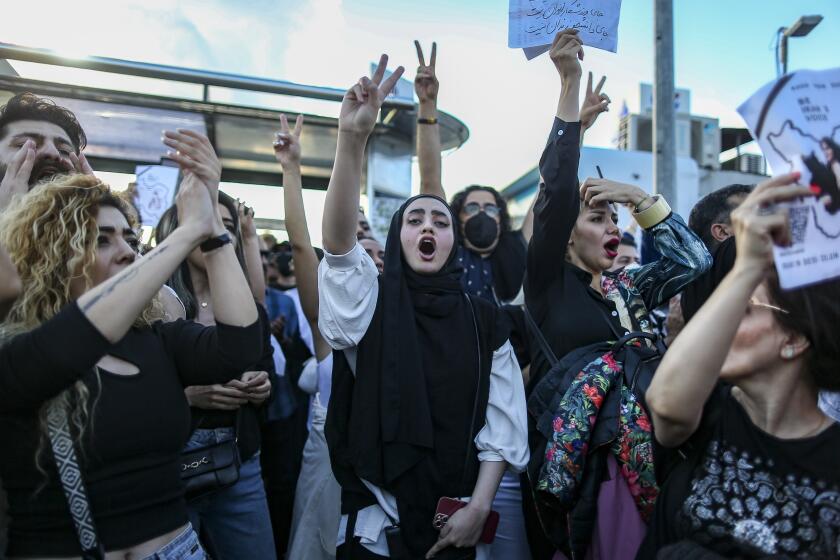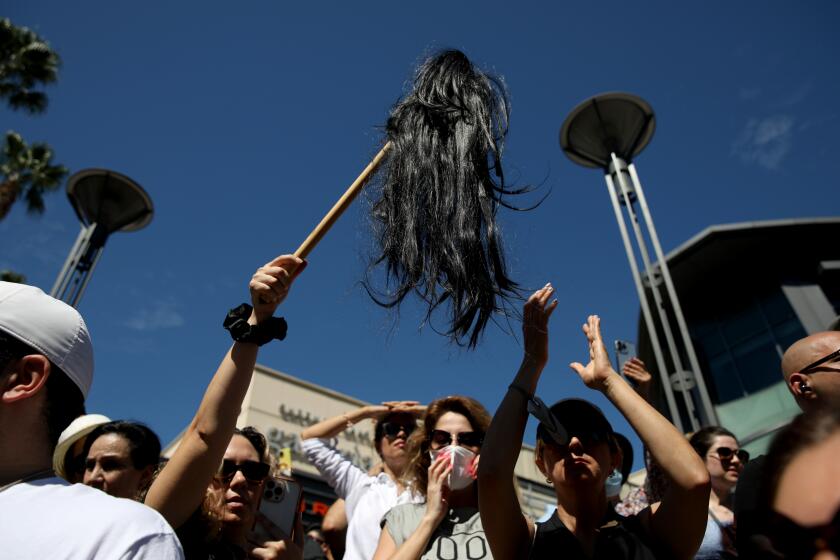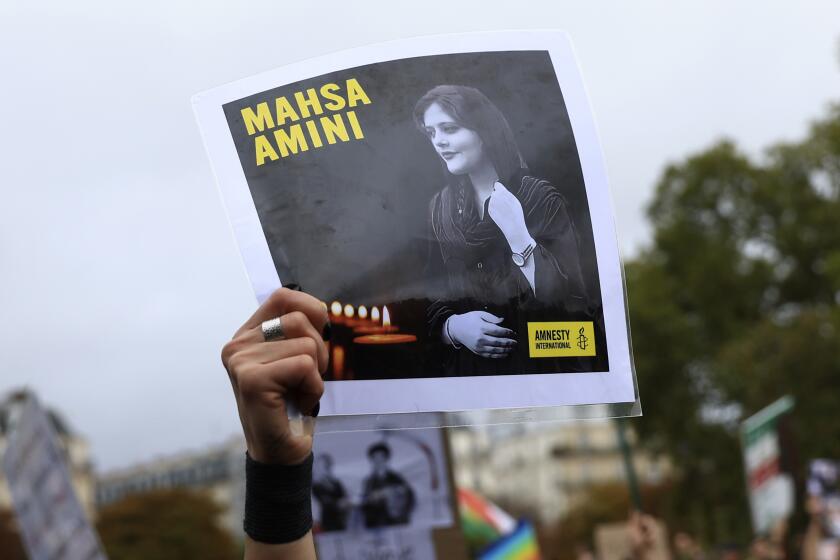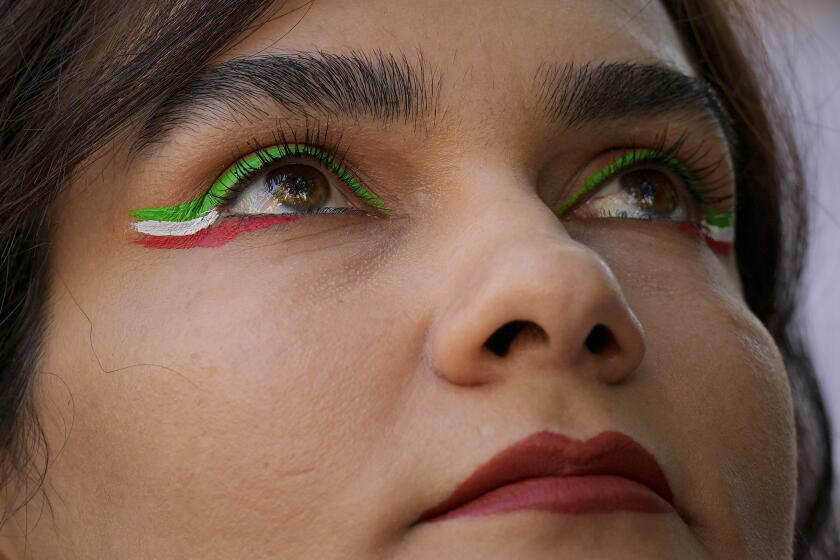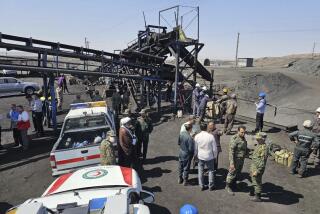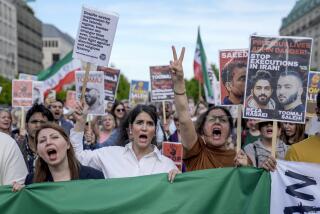Mass protests over young woman’s death reach Iran’s crucial oil and gas industry
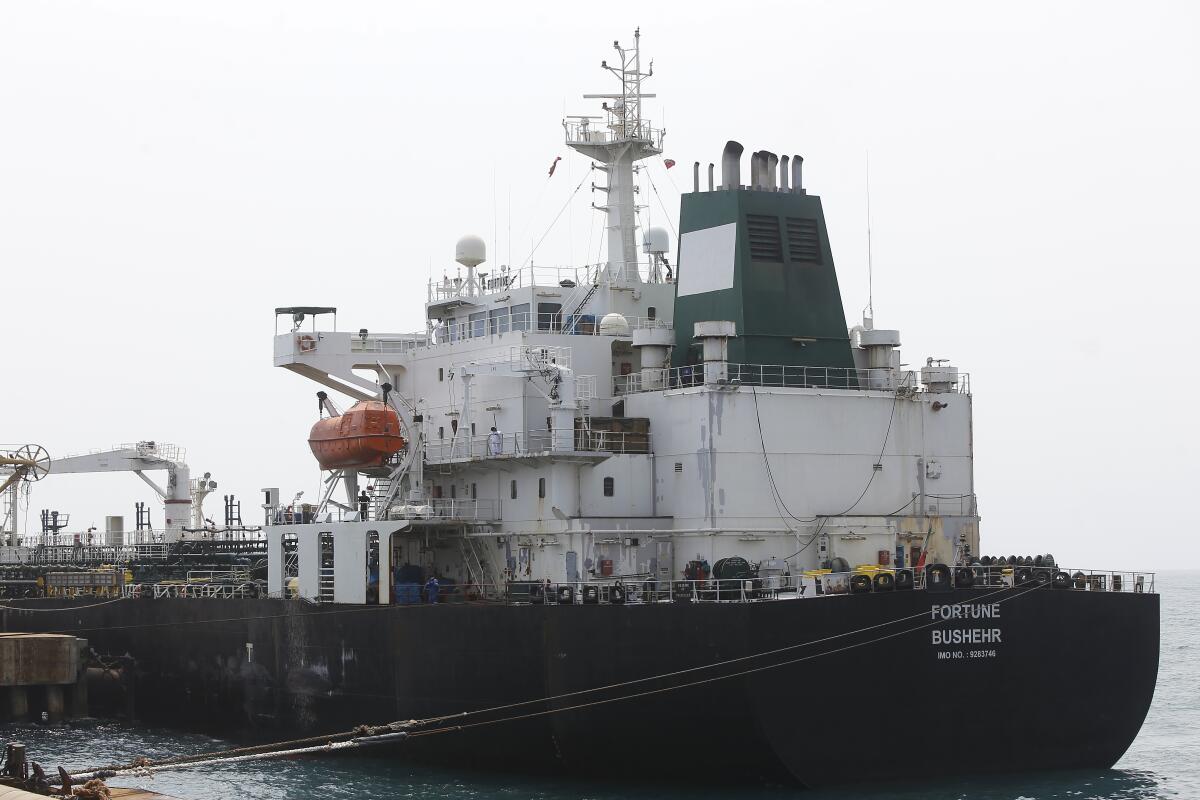
- Share via
DUBAI — Workers at the site of a major complex of refineries crucial for Iran’s massive offshore natural gas field joined the protests roiling the country over the death of 22-year-old Mahsa Amini, online videos appeared to show Monday.
The demonstrations at Asaluyeh mark the first time the unrest surrounding Amini’s death threatened the coffers of Iran’s long-sanctioned theocratic government by reaching its oil and gas industry.
While it remains unclear whether other workers will follow, the protests come as demonstrations rage on in cities, towns and villages across Iran over the Sept. 16 death of Amini after her arrest by the country’s morality police in Tehran. Early on Monday, the sounds of what apparently were gunshots and explosions echoed through the streets of a city in western Iran, while security forces reportedly killed one man in a nearby village, activists said.
Iran’s government insists Amini was not mistreated, but her family says her body showed bruises and other signs of beating. Subsequent videos have shown security forces beating and shoving female protesters, including women who have torn off their mandatory headscarf, or hijab.
From Tehran and elsewhere, online videos have emerged despite authorities disrupting the internet. Videos showed some women marching through the streets without headscarves, while others confronted authorities and lit fires in the street as the protests continue into a fourth week. The demonstrations represent one of the biggest challenges to Iran’s theocracy since the 2009 Green Movement protests.
Online videos analyzed by the Associated Press showed dozens of workers gathered at the refineries in Asaluyeh, 575 miles south of Tehran, on the Persian Gulf. The vast complex takes in natural gas from the massive offshore natural gas field that Iran shares with Qatar.
The mass protests rocking Iran have tapped into a deep well of anger that the government will find harder and harder to assuage even if it wants to.
In one video, the gathered workers — some with their faces covered — chant, “Shameless!” and “Death to the dictator!”
Others show them gathered around the massive network of tanks and industrial features, as well as on a nearby roadway. The details in the videos correspond with each and to known features of the facility compared against satellite photos taken Sunday.
Iran did not acknowledge any disruption at the facility, though the semi-official Tasnim news agency described the incident as a salary dispute. Iran is one of the world’s top natural gas suppliers, after the U.S. and Russia.
The violence early Monday in western Iran occurred in Sanandaj, the capital of Iran’s Kurdistan province, as well as in the village of Salas Babajani near the border with Iraq, according to a Kurdish group called the Hengaw Organization for Human Rights. Amini was Kurdish, and her death has been felt particularly in Iran’s Kurdish region, where demonstrations began Sept. 17 at her funeral there.
From Tehran to Los Angeles, the act of cutting hair has become a form of resistance.
Hengaw posted footage it described as smoke rising in one neighborhood in Sanandaj, with what sounded like rapid rifle fire echoing through the night sky. The shouts of people could be heard.
There was no immediate word if people had been hurt in the violence. Hengaw later posted a video online of what appeared to be collected shell casings from rifles and shotguns, as well as spent tear gas canisters.
Authorities offered no immediate explanation about the violence early Monday in Sanandaj, some 250 miles west of Tehran. Esmail Zarei Kousha, the governor of Iran’s Kurdistan province, alleged without providing evidence that unknown groups “plotted to kill young people on the streets” Saturday, the semi-official Fars news agency reported Monday.
Kousha also accused these unnamed groups that day of shooting a young man in the head and killing him — an attack that activists have roundly blamed on Iranian security forces. They say Iranian forces opened fire after the man honked his car horn at them. Honking has become one of the ways activists have been expressing civil disobedience, an action that has seen riot police in other videos smashing the windshields of passing vehicles.
Anti-government demonstrations have erupted across Iran as the most sustained protests in years against an entrenched theocracy entered a fourth week.
In the village of Salas Babajani, about 60 miles southwest of Sanandaj, Iranian security forces repeatedly shot a 22-year-old man protesting there who later died of his wounds, Hengaw said. It said others had been wounded in the shooting.
It remains unclear how many people have been killed in the demonstrations or by the security force crackdown targeting them. State television last suggested that at least 41 people had been killed in the demonstrations as of Sept. 24. In the more than two weeks since, there’s been no update from Iran’s government.
An Oslo-based group, Iran Human Rights, estimates that at least 185 people have been killed. This includes an estimated 90 people killed in violence in the eastern Iranian city of Zahedan amid demonstrations against a police officer accused of rape in a separate case.
Amnesty International said that security forces killed 66 people in Zahedan on Sept. 30, and that more people were killed in the area in subsequent incidents. Iranian authorities have described the Zahedan violence as involving unnamed separatists, without providing details or evidence.
The killing of Mahsa Amini in Iran have set off worldwide protests by the country’s large diaspora. We hear their stories.
Meanwhile, a prison riot has struck the city of Rasht, killing several inmates there, a prosecutor reportedly said. It wasn’t immediately clear if the riot at Lakan Prison was linked to the ongoing protests, though Rasht has seen heavy demonstrations in recent weeks since Amini’s death.
The semi-official Mehr news agency quoted Gilan provincial prosecutor Mehdi Fallah Miri as saying, “some prisoners died because of their wounds as the electricity was cut [at the prison] because of the damage.” He also alleged that prisoners refused to allow authorities access to those wounded.
Miri described the riot as breaking out in a wing of a prison housing death penalty inmates.
More to Read
Sign up for Essential California
The most important California stories and recommendations in your inbox every morning.
You may occasionally receive promotional content from the Los Angeles Times.
